频度副词和短语
- 格式:ppt
- 大小:2.61 MB
- 文档页数:18
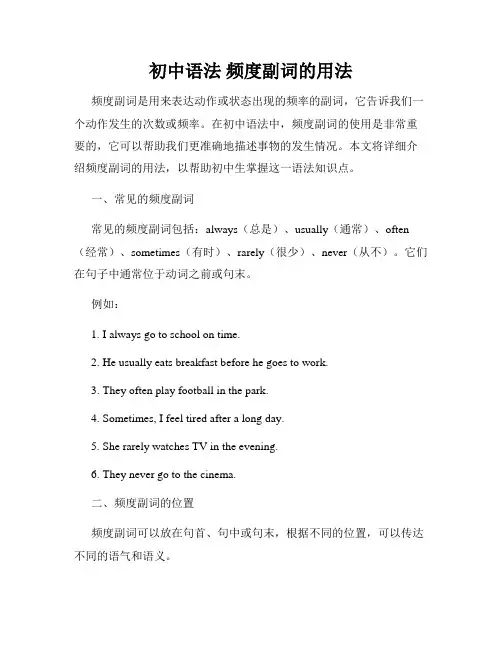
初中语法频度副词的用法频度副词是用来表达动作或状态出现的频率的副词,它告诉我们一个动作发生的次数或频率。
在初中语法中,频度副词的使用是非常重要的,它可以帮助我们更准确地描述事物的发生情况。
本文将详细介绍频度副词的用法,以帮助初中生掌握这一语法知识点。
一、常见的频度副词常见的频度副词包括:always(总是)、usually(通常)、often (经常)、sometimes(有时)、rarely(很少)、never(从不)。
它们在句子中通常位于动词之前或句末。
例如:1. I always go to school on time.2. He usually eats breakfast before he goes to work.3. They often play football in the park.4. Sometimes, I feel tired after a long day.5. She rarely watches TV in the evening.6. They never go to the cinema.二、频度副词的位置频度副词可以放在句首、句中或句末,根据不同的位置,可以传达不同的语气和语义。
1. 句首位置:当频度副词放在句首时,强调的是频度副词本身。
例如:Always, he gets up early in the morning.Usually, she goes to bed at 10 p.m.2. 句中位置:当频度副词放在句中时,通常位于be动词或助动词之后,或者在情态动词之前。
例如:I am always happy to see you.She can usually solve the math problems.They have often traveled to different countries.3. 句末位置:当频度副词放在句末时,强调的是动作本身。

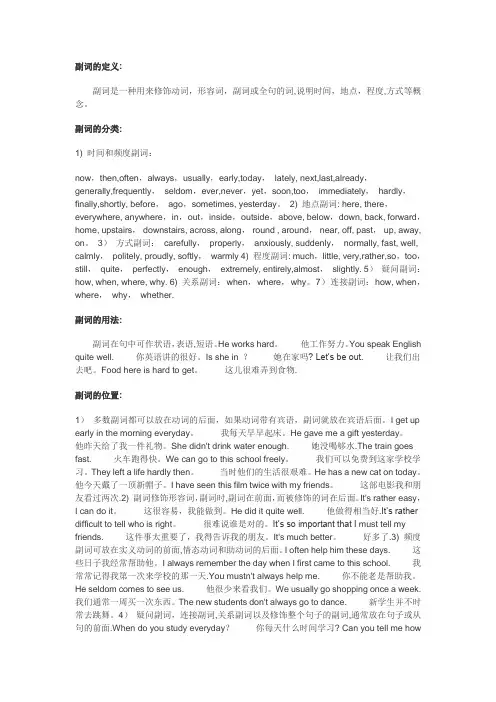
副词的定义:副词是一种用来修饰动词,形容词,副词或全句的词,说明时间,地点,程度,方式等概念。
副词的分类:1) 时间和频度副词:now,then,often,always,usually,early,today,lately, next,last,already,generally,frequently,seldom,ever,never,yet,soon,too,immediately,hardly,finally,shortly, before,ago,sometimes, yesterday。
2) 地点副词: here, there,everywhere, anywhere,in,out,inside,outside,above, below,down, back, forward,home, upstairs,downstairs, across, along,round , around,near, off, past,up, away, on。
3)方式副词:carefully,properly,anxiously, suddenly,normally, fast, well, calmly,politely, proudly, softly,warmly 4) 程度副词: much,little, very,rather,so,too,still,quite,perfectly,enough,extremely, entirely,almost,slightly. 5)疑问副词:how, when, where, why. 6) 关系副词:when,where,why。
7)连接副词:how, when,where,why,whether.副词的用法:副词在句中可作状语,表语,短语。
He works hard。
他工作努力。
You speak English quite well. 你英语讲的很好。
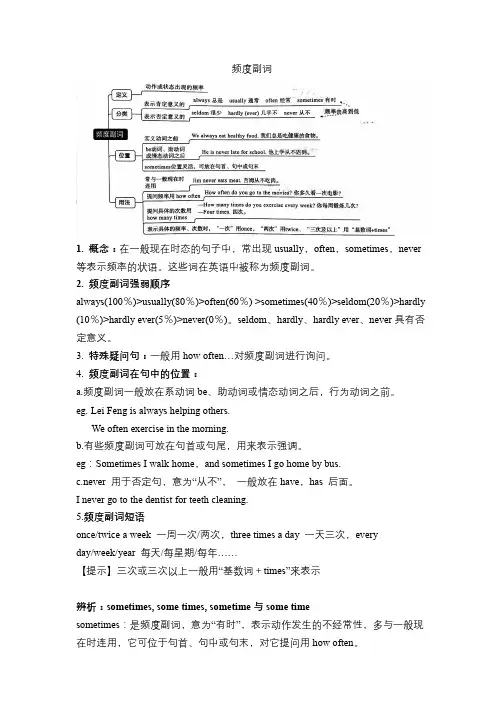
频度副词1. 概念:在一般现在时态的句子中,常出现usually,often,sometimes,never 等表示频率的状语。
这些词在英语中被称为频度副词。
2. 频度副词强弱顺序always(100%)>usually(80%)>often(60%) >sometimes(40%)>seldom(20%)>hardly (10%)>hardly ever(5%)>never(0%)。
seldom、hardly、hardly ever、never具有否定意义。
3. 特殊疑问句:一般用how often…对频度副词进行询问。
4. 频度副词在句中的位置:a.频度副词一般放在系动词be、助动词或情态动词之后,行为动词之前。
eg. Lei Feng is always helping others.We often exercise in the morning.b.有些频度副词可放在句首或句尾,用来表示强调。
eg:Sometimes I walk home,and sometimes I go home by bus.c.never 用于否定句,意为“从不”,一般放在have,has 后面。
I never go to the dentist for teeth cleaning.5.频度副词短语once/twice a week 一周一次/两次,three times a day 一天三次,everyday/week/year 每天/每星期/每年……【提示】三次或三次以上一般用“基数词+times”来表示辨析:sometimes, some times, sometime与some timesometimes:是频度副词,意为“有时”,表示动作发生的不经常性,多与一般现在时连用,它可位于句首、句中或句末,对它提问用how often。
some times是名词短语,意为“几次;几倍”,其中time是可数名词,对它提问用how many times。
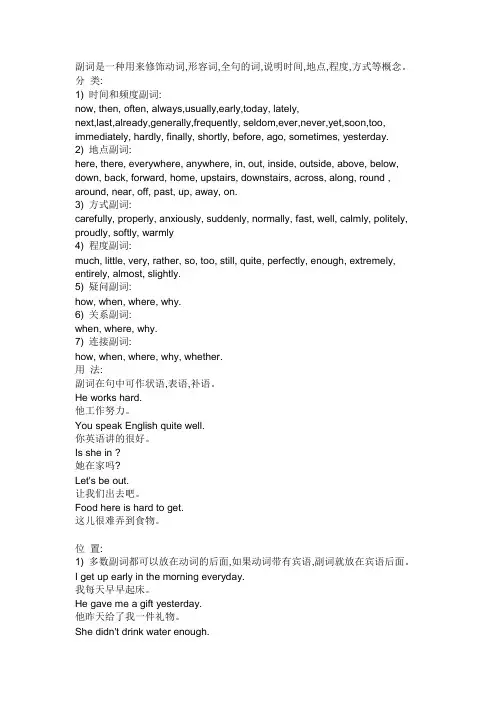
副词是一种用来修饰动词,形容词,全句的词,说明时间,地点,程度,方式等概念。
分类:1) 时间和频度副词:now, then, often, always,usually,early,today, lately,next,last,already,generally,frequently, seldom,ever,never,yet,soon,too, immediately, hardly, finally, shortly, before, ago, sometimes, yesterday.2) 地点副词:here, there, everywhere, anywhere, in, out, inside, outside, above, below, down, back, forward, home, upstairs, downstairs, across, along, round , around, near, off, past, up, away, on.3) 方式副词:carefully, properly, anxiously, suddenly, normally, fast, well, calmly, politely, proudly, softly, warmly4) 程度副词:much, little, very, rather, so, too, still, quite, perfectly, enough, extremely, entirely, almost, slightly.5) 疑问副词:how, when, where, why.6) 关系副词:when, where, why.7) 连接副词:how, when, where, why, whether.用法:副词在句中可作状语,表语,补语。
He works hard.他工作努力。
You speak English quite well.你英语讲的很好。
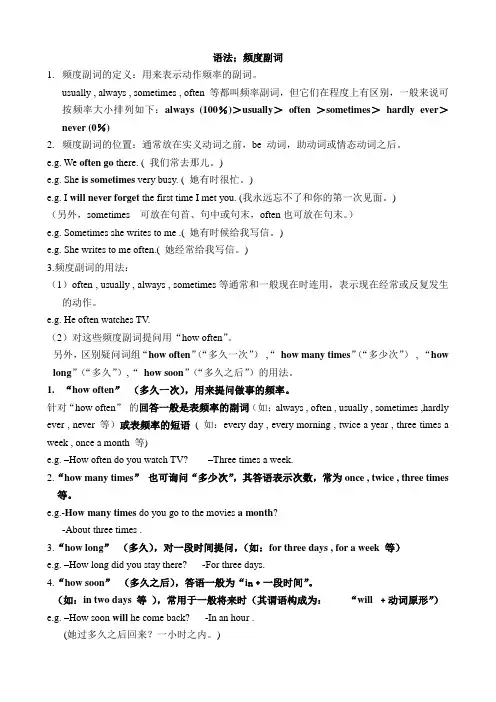
语法;频度副词1.频度副词的定义:用来表示动作频率的副词。
usually , always , sometimes , often 等都叫频率副词,但它们在程度上有区别,一般来说可按频率大小排列如下:always (100%)>usually>often >sometimes>hardly ever>never (0%)2.频度副词的位置:通常放在实义动词之前,be 动词,助动词或情态动词之后。
e.g. We often go there. ( 我们常去那儿。
)e.g. She is sometimes very busy. ( 她有时很忙。
)e.g. I will never forget the first time I met you. (我永远忘不了和你的第一次见面。
)(另外,sometimes 可放在句首、句中或句末,often也可放在句末。
)e.g. Sometimes she writes to me .( 她有时候给我写信。
)e.g. She writes to me often.( 她经常给我写信。
)3.频度副词的用法:(1)often , usually , always , sometimes等通常和一般现在时连用,表示现在经常或反复发生的动作。
e.g. He often watches TV.(2)对这些频度副词提问用“how often”。
另外,区别疑问词组“how often”(“多久一次”),“how many times”(“多少次”), “how long”(“多久”),“how soon”(“多久之后”)的用法。
1.“how often”(多久一次),用来提问做事的频率。
针对“how often”的回答一般是表频率的副词(如;always , often , usually , sometimes ,hardly ever , never 等)或表频率的短语( 如:every day , every morning , twice a year , three times a week , once a month 等)e.g. –How often do you watch TV? –Three times a week.2.“how many times”也可询问“多少次”,其答语表示次数,常为once , twice , three times等。
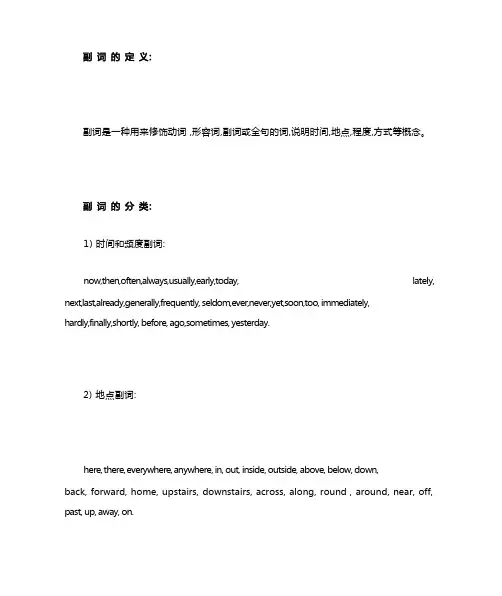
副词是一种用来修饰动词 ,形容词,副词或全句的词,说明时间,地点,程度,方式等概念。
1) 时间和频度副词:now,then,often,always,usually,early,today,next,last,already,generally,frequently, seldom,ever,never,yet,soon,too, immediately,hardly,finally,shortly, before, ago,sometimes, yesterday.2) 地点副词:here, there, everywhere, anywhere, in, out, inside, outside, above, below, down,back, forward, home, upstairs, downstairs, across, along, round , around, near, off, past, up, away, on.lately,3) 方式副词:carefully, properly, anxiously, suddenly, normally, fast, well, calmly, politely, proudly, softly, warmly4) 程度副词:much,little, very,rather,so,too,still, quite, perfectly, enough, extremely, entirely,almost, slightly.5) 疑问副词:how, when, where, why.6) 关系副词:when, where, why.7) 连接副词:how, when, where, why, whether.副词在句中可作状语,表语,短语。
He works hard.他工作努力。
Youspeak Englishquite well. 你英语讲的很好。
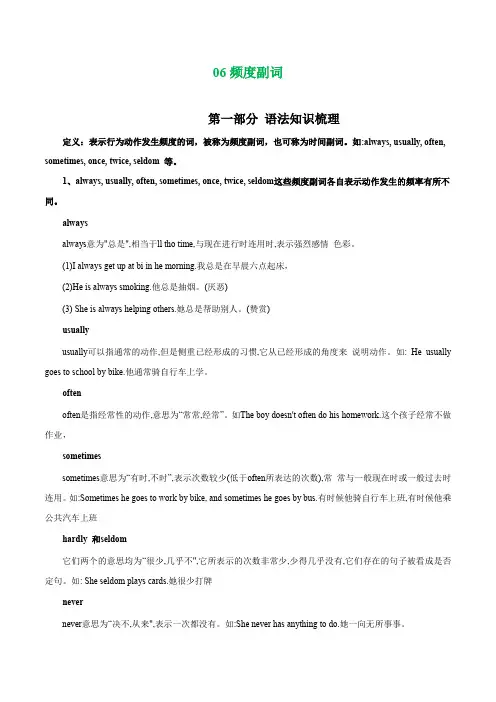
06频度副词第一部分语法知识梳理定义:表示行为动作发生频度的词,被称为频度副词,也可称为时间副词。
如:always, usually, often, sometimes, once, twice, seldom 等。
1、always, usually, often, sometimes, once, twice, seldom这些频度副词各自表示动作发生的频率有所不同。
alwaysalways意为"总是",相当于ll tho time,与现在进行时连用时,表示强烈感情色彩。
(1)I always get up at bi in he morning.我总是在早晨六点起床,(2)He is always smoking.他总是抽烟。
(厌恶)(3) She is always helping others.她总是帮助别人。
(赞赏)usuallyusually可以指通常的动作,但是侧重已经形成的习惯,它从已经形成的角度来说明动作。
如: He usually goes to school by bike.他通常骑自行车上学。
oftenoften是指经常性的动作,意思为“常常,经常”。
如The boy doesn't often do his homework.这个孩子经常不做作业,sometimessometimes意思为“有时,不时”,表示次数较少(低于often所表达的次数),常常与一般现在时或一般过去时连用。
如:Sometimes he goes to work by bike, and sometimes he goes by bus.有时候他骑自行车上班,有时候他乘公共汽车上班hardly 和seldom它们两个的意思均为“很少,几乎不",它所表示的次数非常少,少得几乎没有,它们存在的句子被看成是否定句。
如: She seldom plays cards.她很少打牌nevernever意思为“决不,从来",表示一次都没有。
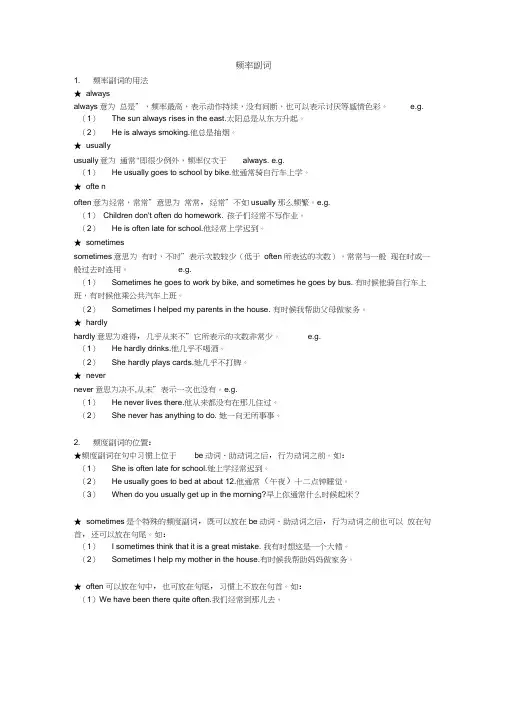
频率副词1. 频率副词的用法★alwaysalways意为总是”,频率最高,表示动作持续,没有间断,也可以表示讨厌等感情色彩。
e.g.(1)The sun always rises in the east.太阳总是从东方升起。
(2)He is always smoking.他总是抽烟。
★usuallyusually意为通常"即很少例外,频率仅次于always. e.g.(1)He usually goes to school by bike.他通常骑自行车上学。
★ofte noften意为经常,常常”意思为常常,经常”不如usually那么频繁。
e.g.(1)Children don't often do homework. 孩子们经常不写作业。
(2)He is often late for school.他经常上学迟到。
★sometimessometimes意思为有时,不时”表示次数较少(低于often所表达的次数),常常与一般现在时或一般过去时连用。
e.g.(1)Sometimes he goes to work by bike, and sometimes he goes by bus. 有时候他骑自行车上班,有时候他乘公共汽车上班。
(2)Sometimes I helped my parents in the house. 有时候我帮助父母做家务。
★hardlyhardly意思为难得,几乎从来不”它所表示的次数非常少。
e.g.(1)He hardly drinks.他几乎不喝酒。
(2)She hardly plays cards.她几乎不打牌。
★nevernever意思为决不,从未”表示一次也没有。
e.g.(1)He never lives there.他从来都没有在那儿住过。
(2)She never has anything to do. 她一向无所事事。
2. 频度副词的位置:★频度副词在句中习惯上位于be动词、助动词之后,行为动词之前。
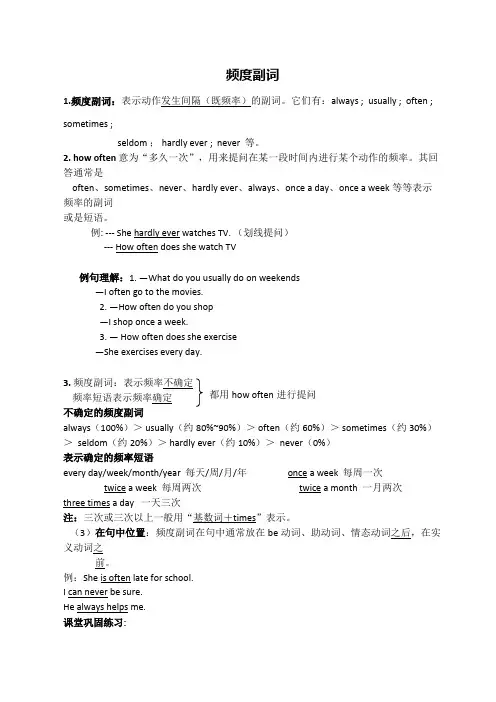
频度副词1.频度副词:表示动作发生间隔(既频率)的副词。
它们有:always ; usually ; often ; sometimes ;seldom ; hardly ever ; never 等。
2. how often意为“多久一次”,用来提问在某一段时间内进行某个动作的频率。
其回答通常是often、sometimes、never、hardly ever、always、once a day、once a week等等表示频率的副词或是短语。
例: --- She hardly ever watches TV. (划线提问)--- How often does she watch TV例句理解:1. —What do you usually do on weekends—I often go to the movies.2. —How often do you shop—I shop once a week.3. — How often does she exercise—She exercises every day.3.频度副词:表示频率不确定频率短语表示频率确定不确定的频度副词always(100%)> usually(约80%~90%)> often(约60%)> sometimes(约30%)> seldom(约20%)> hardly ever(约10%)> never(0%)表示确定的频率短语every day/week/month/year 每天/周/月/年 once a week 每周一次twice a week 每周两次 twice a month 一月两次three times a day 一天三次注:三次或三次以上一般用“基数词+times”表示。
(3)在句中位置:频度副词在句中通常放在be动词、助动词、情态动词之后,在实义动词之前。
例:She is often late for school.I can never be sure.He always helps me.课堂巩固练习:一、对划线部分提问1)He always plays basketball after school._______ does he always _______ after school2) They hardly ever play football._______ _________ ________ they play football二、单项选择( ) 1. ---How often ______ she exercise ---Twice a week.A. doB. doesC. doingD. did( ) 2. I ______ like to drink milk.A. notB. doesn’tC. don’tD. no( ) you go swimming ---Sometimes.A. How oftenB. How longC. how manyD. How old( )4. Katrina watches TV once ______ week.A. aB. theC. anD. ﹨知识扩展:1. how long多久(用来提问有多长时间)回答通常是more than two weeks、for a week、ten years等表示一段时间的状语。
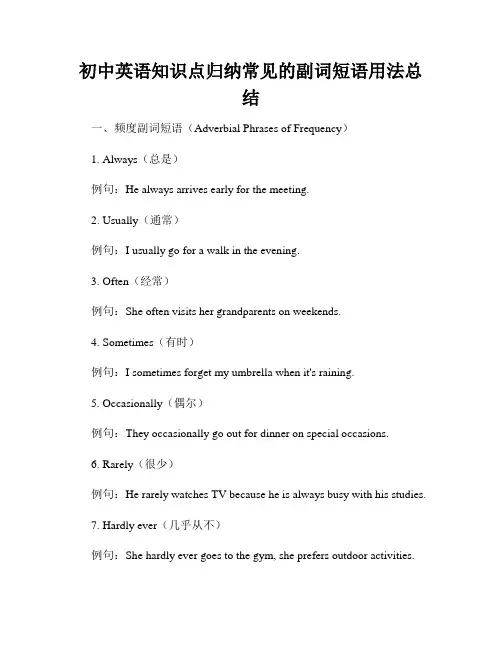
初中英语知识点归纳常见的副词短语用法总结一、频度副词短语(Adverbial Phrases of Frequency)1. Always(总是)例句:He always arrives early for the meeting.2. Usually(通常)例句:I usually go for a walk in the evening.3. Often(经常)例句:She often visits her grandparents on weekends.4. Sometimes(有时)例句:I sometimes forget my umbrella when it's raining.5. Occasionally(偶尔)例句:They occasionally go out for dinner on special occasions.6. Rarely(很少)例句:He rarely watches TV because he is always busy with his studies.7. Hardly ever(几乎从不)例句:She hardly ever goes to the gym, she prefers outdoor activities.8. Never(从不)例句:They never miss a chance to travel during summer vacation.二、时间副词短语(Adverbial Phrases of Time)1. In the morning/afternoon/evening(在早晨/下午/晚上)例句:I exercise in the morning before going to work.2. On weekdays/weekends(在工作日/周末)例句:I have to work on weekdays but I relax on weekends.3. At night(在晚上)例句:They like to stargaze at night in their backyard.4. By the end of(到...结束)例句:She will finish her project by the end of next week.5. In the meantime(与此同时)例句:While waiting for the bus, he read a book in the meantime.6. At the same time(同时)例句:They arrived at the party at the same time.7. From time to time(时常)例句:He visits his grandparents from time to time.8. All day/night long(整天/整晚)例句:They were dancing all night long at the party.三、地点副词短语(Adverbial Phrases of Place)1. In the park(在公园)例句:They often have picnics in the park on weekends.2. At school(在学校)例句:I met my friends at school during lunch break.3. On the beach(在海滩)例句:They love swimming and sunbathing on the beach.4. In the city/countryside(在城市/农村)例句:She enjoys the tranquility of living in the countryside.5. At home(在家)例句:He spends most of his weekends at home with his family. 6. On the way(在路上)例句:They had a great conversation on the way to the airport. 7. Across the road(在马路对面)例句:The supermarket is just across the road, it's very convenient.四、方式副词短语(Adverbial Phrases of Manner)1. In a hurry(匆忙地)例句:She left the house in a hurry because she was late for work.2. With pleasure(乐意地)例句:I will help you move next week, with pleasure.3. In a loud voice(大声地)例句:He shouted in a loud voice to get the attention of the audience.4. On purpose(故意地)例句:He spilled the drink on purpose to annoy his sister.5. By accident(偶然地)例句:I found this lost wallet by accident while walking in the park.6. In a funny way(滑稽地)例句:He imitates his teacher in a funny way and makes everyone laugh.7. In a serious manner(严肃地)例句:The teacher spoke to the students in a serious manner about their behavior.总结:副词短语在英语中起到修饰动词、形容词、副词和整个句子的作用,能够更准确地表达出时间、地点、方式和频率等信息。
频度副词含义:表示次数,频率的副词称为频度副词。
比如像usually,sometimes,always,often.位置:(1)在be动词之后,eg:she is sometimes very busy.他有时很忙。
(2)在第一个助动词或情态动词之后,eg:I will never forget the first time I met you.我永远不会忘记我们的第一次见面。
(3)在实意动词之前。
We often go there.我们经常去那儿。
(4)sometimes可放在句首、句中或句末,often放在句中或句末。
Eg:sometimes she watches TV.他有时看电视。
She watches TV often.用法:often,always,usually,等常和一般现在时连用,表示经常或反复发生的动作。
Eg:it often rains here.·对频度副词的提问用how often.Eg;I sometimes write to my brother..有时候,我写信给我的弟弟。
How often do you write to your brother?你多久给你弟弟写一次信?辨析:sometimes,some times,sometime,some timeSometimes,频度副词,意为“有时”Some times名词短语,意为“好多次,”“几倍’sometime副词意为过去或将来的某个时候Some time名词短语意为“一段时间”Eg:I sometimes play games with her.我有时和他玩游戏。
I have read the book some times.这本书我已经读了这本书好几遍了。
Come to see us sometime.找个时间来看我们。
I will stay here for some time.我将在这儿呆一段按时间。
Unit 2 Daily life(2)Date:_______ name:________【知识要点】频度副词:一、常见的频率副词有:always,usually,often,sometimes,seldom,never.1. always表示的频率为100%,意思是"总是、一直、始终"。
I always do my cleaning on Sundays. 我总是在星期天搞卫生。
2. usually与always相比,表示的频率要低些,约为70%-80%。
意思是"通常"。
Plants are usually green. 植物通常是绿色的。
Usually she goes to work by bus. 她通常乘公共汽车去上班。
3. often的频率比usually又略低些,约为60%-70%,意思是"经常"、"常常"。
Do you often write to them? 你常给他们写信吗?Does Fred come here often? 弗雷德常来这儿吗?4. sometimes的频率比often又低些,约为50%>sometimes>30%,意思是“有时、不时”。
Jenny usually eats a sandwich for lunch. Sometimes she eats soup.5. seldom 的频率比sometimes还要低些,约为20%左右,意思是“很少”。
My father was seldom at home on Sundays. 我父亲星期天很少在家。
6. never与always完全相反,是100%否定,意思是“从不,决不,绝不,总是不“。
I can never stop. 我绝不会停止。
Lily never wears dresses. 李明从不穿裙子。
I would never do anything to hurt him. 我绝不会做任何伤害他的事情。
频度副词是表示动作发生的频率的副词,如:always(总是),usually(通常),often(经常),sometimes(有时),seldom(不常),rarely(很少),never(从不)等。
频度副词在句子中的位置比较灵活,可以放在句首、句中或句末,但通常放在行为动词之前,助动词、情态动词或be动词之后。
例如:
She always gets up early.(她总是早起。
)
He usually does his homework after dinner.(他通常晚饭后做作业。
)
We sometimes go to the movies on weekends.(我们有时周末去看电影。
)
此外,频度副词还可以用来表示某一段时间内某事发生的次数,常与表示时间段的时间状语连用,也可以用于一般将来时态,表示将来某一时间内发生的动作或情况。
例如:
I will always remember this day.(我将永远记住这一天。
)
They will often come to see us.(他们将经常来看我们。
)
需要注意的是,频度副词虽然表示动作发生的频率,但并不表示动作发生的具体时间。
因此,在描述具体的时间点时,需要与其他时间状语结合使用。
总之,频度副词是英语中常用的副词之一,掌握其用法可以帮助我们更准确地表达动作发生的频率和时间。
频度副词讲解与练习:修改名词为“形容词短语”频度副词是用来表示动作发生频率的副词,它们可以对名词进行修饰,形成形容词短语,用以描述事物的频率。
本文将对频度副词进行讲解,并提供相应的练。
频度副词讲解频度副词一般用来回答问题“多久一次”,具体的频度副词包括:- Always(总是)- Usually(通常)- Often(经常)- Sometimes(有时)- Rarely(很少)- Never(从不)这些频度副词可以用来修饰名词,形成形容词短语,例如:- An always punctual person(一个总是准时的人)- A usually cheerful smile(一个通常开心的微笑)- An often misunderstood concept(一个经常被误解的概念)- A sometimes challenging task(一个有时具有挑战性的任务)- A rarely seen bird(一种很少见的鸟)- A never-ending story(一个永无止境的故事)练示例任务一将下列名词转化为形容词短语,并写出相应的中文意思。
1. A always busy city(回答:一个总是忙碌的城市)2. A usually crowded restaurant(回答:一个通常拥挤的餐厅)3. An often overlooked detail(回答:一个经常被忽视的细节)任务二造句,使用以下频度副词修饰名词。
- Sometimes- Rarely- Never请回答:1. Use "sometimes" to modify the noun "meeting"2. Use "rarely" to modify the noun "opportunity"3. Use "never" to modify the noun "happening"(回答示例:)1. I attend the team meeting sometimes.2. I have a rarely seen opportunity.3. It's a never-ending happening.以上是频度副词讲解与练的详细内容,希望能对你的研究有所帮助。